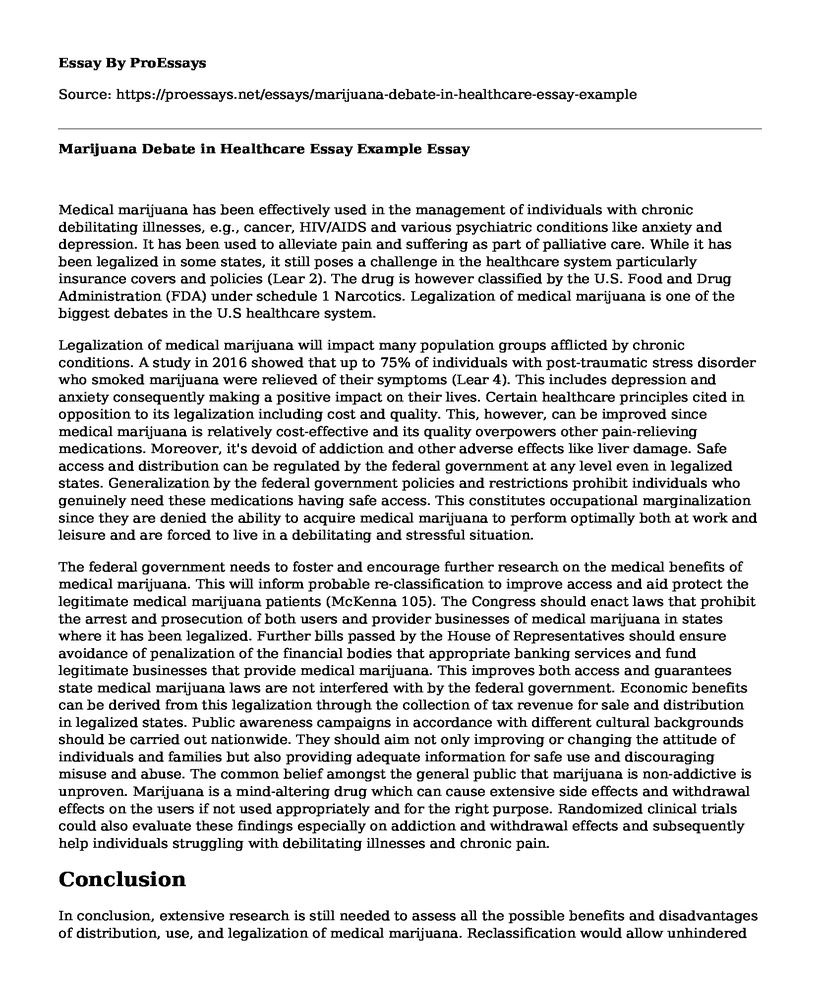Medical marijuana has been effectively used in the management of individuals with chronic debilitating illnesses, e.g., cancer, HIV/AIDS and various psychiatric conditions like anxiety and depression. It has been used to alleviate pain and suffering as part of palliative care. While it has been legalized in some states, it still poses a challenge in the healthcare system particularly insurance covers and policies (Lear 2). The drug is however classified by the U.S. Food and Drug Administration (FDA) under schedule 1 Narcotics. Legalization of medical marijuana is one of the biggest debates in the U.S healthcare system.
Legalization of medical marijuana will impact many population groups afflicted by chronic conditions. A study in 2016 showed that up to 75% of individuals with post-traumatic stress disorder who smoked marijuana were relieved of their symptoms (Lear 4). This includes depression and anxiety consequently making a positive impact on their lives. Certain healthcare principles cited in opposition to its legalization including cost and quality. This, however, can be improved since medical marijuana is relatively cost-effective and its quality overpowers other pain-relieving medications. Moreover, it's devoid of addiction and other adverse effects like liver damage. Safe access and distribution can be regulated by the federal government at any level even in legalized states. Generalization by the federal government policies and restrictions prohibit individuals who genuinely need these medications having safe access. This constitutes occupational marginalization since they are denied the ability to acquire medical marijuana to perform optimally both at work and leisure and are forced to live in a debilitating and stressful situation.
The federal government needs to foster and encourage further research on the medical benefits of medical marijuana. This will inform probable re-classification to improve access and aid protect the legitimate medical marijuana patients (McKenna 105). The Congress should enact laws that prohibit the arrest and prosecution of both users and provider businesses of medical marijuana in states where it has been legalized. Further bills passed by the House of Representatives should ensure avoidance of penalization of the financial bodies that appropriate banking services and fund legitimate businesses that provide medical marijuana. This improves both access and guarantees state medical marijuana laws are not interfered with by the federal government. Economic benefits can be derived from this legalization through the collection of tax revenue for sale and distribution in legalized states. Public awareness campaigns in accordance with different cultural backgrounds should be carried out nationwide. They should aim not only improving or changing the attitude of individuals and families but also providing adequate information for safe use and discouraging misuse and abuse. The common belief amongst the general public that marijuana is non-addictive is unproven. Marijuana is a mind-altering drug which can cause extensive side effects and withdrawal effects on the users if not used appropriately and for the right purpose. Randomized clinical trials could also evaluate these findings especially on addiction and withdrawal effects and subsequently help individuals struggling with debilitating illnesses and chronic pain.
Conclusion
In conclusion, extensive research is still needed to assess all the possible benefits and disadvantages of distribution, use, and legalization of medical marijuana. Reclassification would allow unhindered study and evaluation of these aspects to allow informed decision making. Legalization should, however, be guided by scientific research and not the necessity. Strict regulation is therefore in order, and federal laws should not be entirely overturned.
Works Cited
Lear-Phillips, John T. "Medical Marijuana, and the Healthcare System." Kentucky Journal of Undergraduate Scholarship 2.1 (2018): 4.
McKenna, Gerald J. "The current status of medical marijuana in the United States." Hawai'i Journal of Medicine & Public Health 73.4 (2014): 105.
Cite this page
Marijuana Debate in Healthcare Essay Example. (2022, Nov 06). Retrieved from https://proessays.net/essays/marijuana-debate-in-healthcare-essay-example
If you are the original author of this essay and no longer wish to have it published on the ProEssays website, please click below to request its removal:
- Essay Sample on the Use of Medical Marijuana
- Essay Example on Random Factor Linked to Cancer: An Unending Burden
- Essay Example on CT Scan: Peering Into the Human Body with X-Rays
- Essay Example Long-Term Care Facilities: At Risk During Flu Outbreaks
- Essay Example on Addiction Recovery: A Journey to Mental, Physical, and Spiritual Balance
- Essay Sample on Alcohol Liver Disease: The Difficulty of Obtaining a Liver Transplant
- Essay Example on Increase in Chronic Diseases: Employer Wellness Programs to the Rescue







